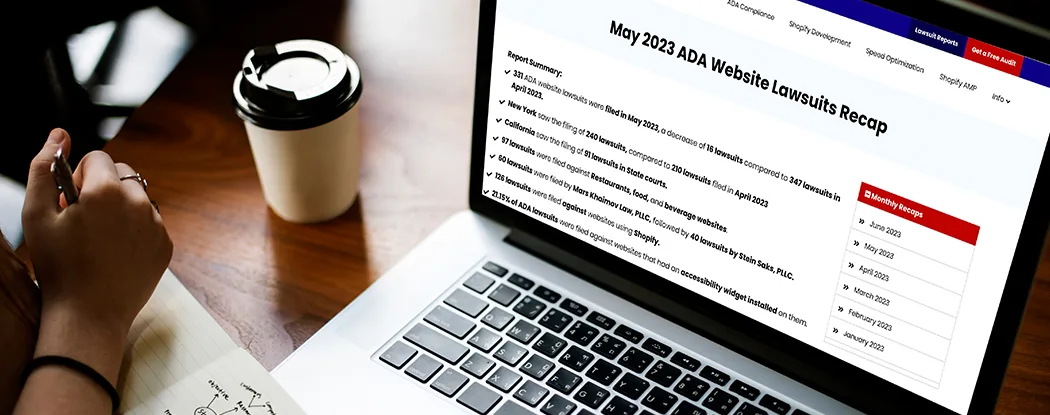Introduction: The Digital Frontier of Accessibility
In an age where our digital footprint dictates much of our daily lives, the significance of a universally approachable online environment is paramount. ADA, or the Americans with Disabilities Act, is steering this change, ensuring the digital realm is as inclusive as the physical. Yet, as businesses aim to align with ADA’s digital compliance standards, the month of May 2023 saw an unexpected surge in ADA-related lawsuits. Through this blog, EcomBack unravels these lawsuits, offering a meticulous recap and the invaluable lessons they bring to the forefront.
The Core of ADA’s Digital Mandate
Understanding the essence of ADA (Americans with Disabilities Act) compliance in the digital domain is pivotal. Here’s what ADA compliance stands for:
- Unrestricted Access: ADA compliance is all about ensuring that everyone, regardless of their physical or cognitive disabilities, can engage with digital content. It means creating websites, apps, and online materials in a way that they are accessible to all individuals, including those with visual, auditory, motor, or cognitive impairments. This commitment to unrestricted access is not just a legal requirement but a moral imperative to ensure inclusivity and equal opportunities in the digital age.
- Enhancing Brand Equity: Businesses that prioritize and excel in accessibility witness a significant boost in their brand equity. By embracing ADA compliance, companies signal their commitment to inclusivity and social responsibility. This resonates positively with both existing and potential customers, as well as with the general public. Such businesses are seen as ethical, caring, and responsive to diverse customer needs, leading to increased trust and loyalty.
- Safeguard Against Legal Issues: Proactive ADA compliance goes a long way in minimizing the risks associated with potential legal confrontations. ADA regulations require that digital content, including websites and mobile apps, be accessible to individuals with disabilities. Failure to meet these requirements can result in lawsuits, fines, and damage to a company’s reputation. By investing in accessibility from the start, businesses not only avoid legal troubles but also create a more inclusive and welcoming online environment for everyone.
Unpacking the ADA Website Lawsuits of May 2023
The month of May 2023 witnessed a surge in ADA website lawsuits that have provided valuable insights and lessons for businesses. Let’s delve into the key cases and their implications:
- The Significance of Alt Texts: In a notable legal case, a prominent e-commerce giant found itself in hot water due to the absence of alt texts for their website visuals. This incident serves as a stark reminder that seemingly minor oversights, such as neglecting to provide alternative text descriptions for images, can lead to substantial legal consequences. Ensuring that all visual content is accompanied by descriptive alt texts is not only an accessibility best practice but also a legal necessity.
- The Crucial Role of Multimedia Accessibility: Another case that made headlines involved an emerging e-learning platform. This platform faced legal challenges for failing to incorporate closed captions for its online courses. This case underscores the absolute importance of making multimedia elements, including videos and audio content, accessible to individuals with disabilities. Integrating closed captions and transcripts is a vital step towards ensuring that all users can access and benefit from educational content.
- Navigational Non-Negotiables: In a trending blog’s legal battle, the issue at hand was its complex and challenging keyboard-only navigation system. This case underscores that web accessibility extends beyond the content itself—it also encompasses the ease of use and navigation on a website. Ensuring that individuals with disabilities can navigate a site effectively using keyboard controls is a non-negotiable aspect of accessibility compliance.
These lawsuits from May 2023 serve as crucial reminders that businesses must prioritize web accessibility to avoid legal repercussions. To steer clear of such situations, organizations should conduct regular accessibility audits, implement best practices, and stay informed about evolving accessibility guidelines and regulations. Ultimately, creating an inclusive digital environment not only mitigates legal risks but also opens doors to a broader audience and fosters a more equitable online experience for all users.
Crafting a Future-proof ADA Strategy: Guidance for Enterprises
The ADA lawsuits from May 2023 are not just isolated incidents but indicators of a larger trend. Here’s a roadmap for businesses:
- Stay Informed: Continually update yourself on ADA’s ever-changing guidelines.
- Undertake Regular Checkups: Conducting routine audits can preempt potential compliance oversights.
- Engage with Specialists: Partnering with experts like EcomBack can ensure that your website not only complies but thrives in an ADA-regulated digital landscape.
Why Choose EcomBack for ADA Compliance?
In today’s digital landscape, where inclusivity and accessibility are paramount, adhering to the Americans with Disabilities Act (ADA) compliance is not merely a legal requirement but a moral imperative. As businesses strive to ensure their online spaces are universally accessible, EcomBack stands out as a beacon of expertise. Here’s an in-depth look at why EcomBack is the premier choice for ADA compliance:
1. Rigorous Website Analysis:
At EcomBack, we don’t just skim the surface. Our team dives deep into the fabric of your website, conducting a thorough analysis. We meticulously identify areas where your website may fall short of ADA standards and provide detailed insights into those gaps. Our findings don’t just pinpoint the challenges; they pave the way for actionable solutions, ensuring your site is not only compliant but optimized for accessibility.
2. Customized Accessibility Solutions:
We recognize that every business is unique, and so are its digital accessibility needs. Rather than adopting a one-size-fits-all approach, EcomBack crafts bespoke solutions tailored to your website’s specific requirements. Our mission is to ensure that your online presence is not only ADA-compliant but also genuinely welcoming and user-friendly for all visitors, irrespective of their abilities.
3. Consistent and Sustained Support:
The digital world is ever-evolving, with technological advancements and changes in accessibility standards constantly emerging. Staying abreast of these shifts is crucial to maintain continuous compliance. EcomBack is committed to being your long-term partner in this journey. We offer sustained assistance, periodic audits, and updates, ensuring that your digital space remains compliant and inclusive as the landscape evolves.
In a nutshell, EcomBack doesn’t just help businesses meet ADA standards; we empower them to champion digital inclusivity. With our comprehensive approach, businesses can be confident that their digital platforms are not just compliant, but truly accessible to all. Choose EcomBack, and embrace a digital space that epitomizes inclusivity and excellence.
Explore our exhaustive report on the May lawsuits and equip yourself with the nuances of ADA compliance.
Conclusion: Embracing ADA is Embracing the Future
EcomBack’s detailed recap of the ADA Website Lawsuits in May 2023 serves as a testament to the urgency of digital inclusivity. Businesses must realize that being ADA-compliant isn’t just about avoiding lawsuits; it’s about paving the way for a more inclusive future. With EcomBack, journey confidently into this future, ensuring every step is in stride with ADA’s vision.



